- Home
- Tim Tingle
A Name Earned
A Name Earned Read online
A Name Earned
Tim Tingle
7th Generation
Summertown, Tennessee
Library of Congress Cataloging-in-Publication Data is available upon request.
© 2018 Tim Tingle
Cover design: John Wincek
All rights reserved. No portion of this book may be reproduced by any means whatsoever, except for brief quotations in reviews, without written permission from the publisher.
7th Generation
an imprint of Book Publishing Company
PO Box 99, Summertown, TN 38483
888-260-8458
bookpubco.com
nativevoicesbooks.com
ISBN: 978-1-939053-18-3
23 22 21 20 19 18 1 2 3 4 5 6 7 8 9
Contents
Chapter 1: Not Again
Chapter 2: The Accident
Chapter 3: Glass in the Shoulder
Chapter 4: Mr. Blanton, Basketball Fan
Chapter 5: Game Day, Gotta Focus
Chapter 6: DAA, First Meeting
Chapter 7: Alone in a Crowd
Chapter 8: Underground Meeting of the Minds
Chapter 9: A Dad Who’s Proud?
Chapter 10: Midnight Express
Chapter 11: Bobby Backtalk
Chapter 12: Leafy Dad Comes Clean
Chapter 13: Baldy Lady Faye
Chapter 14: Elbow to the Face
Chapter 15: Win One for Lloyd
Chapter 16: Clean, Hard Basketball
Chapter 17: Standing at the Gates
Chapter 18: Candle in the Dark
Chapter 19: First Time for Everything
About the Author
To Robbie Trujillo, who has faced and overcome tough life challenges and “earned his name.”
CHAPTER 1
Not Again
“It was an accident.”
How many times have I heard that?
It was an accident.
From the time I was a little kid.
It was an accident.
Dad didn’t mean to break my shoulder. Hoke, yeah, he might have meant to shove me down the stairs. But the stairs are carpeted, the floor is carpeted—what’s my problem anyway?
It was an accident.
So Mom left, and I dug a hole in the backyard, behind a giant oak tree. I had to hide somewhere. I found an old wooden door at a nearby junkyard and somehow carried it home. I tossed it over our backyard fence, dragged it across the yard, and covered the hole with it. I glued leaves and grass and broken branches on top of the door, so it looked like our weedy and overgrown backyard.
Nothing more.
So I now had my very own secret backyard room. And since it was summertime and Dad didn’t report me missing, I was free.
Yeah. Free.
All I had to do was keep away from Dad. With the help of my best friend, Johnny, I dug a small tunnel at the front of the hole, facing our back patio. I put a thick plastic pipe through the hole, so I could see and hear Dad when he sat on the patio, drinking and talking with his buddies.
But after a while, even his drinking buddies got tired of hearing him fuss about me—his only son, his only child, whom he hadn’t seen for a week.
Then a month.
Then who’s counting?
An impossible situation, right?
Wrong.
Basketball saved my life. And maybe being a member of the Choctaw Nation of Oklahoma had something to do with it, too.
“Always give thanks to the ancestors,” Dad often said. “You remember them, they remember you.” Yes, he drank his beer, but he was also proud to be Choctaw, and so was Mom.
And so was Coach Robison, the first American Indian ever to coach a sports team at our school. He was Choctaw too, and he wanted me to play on the team. Me! I had never played a game in my life, except on the playground. I spent hours on the outdoor court, every day.
To get away from Dad. And I’m not a big guy, but I can shoot a three-pointer. I learned to nail it from any distance.
I can dribble without looking at the ball. I can go left or right, so nobody can guard me by overplaying. You learn those things on the playground, where make-it-take-it rules. You lose, you sit down.
One evening, as I sat in my underground room, watching Dad and Coach on the back patio, Coach waited for Dad to set his drink down. The conversation went something like this.
“Byington,” he said, “what would you say if Bobby played high school basketball?”
“I’d say you’re crazier than I thought you were!” Dad shouted. “What kinda joke is this?”
“No joke,” Coach replied. “You might not know it, but he shoots a three-pointer as well as anybody I’ve ever seen, this side of the NBA.”
“And where did he learn to do that?”
“At the playground. At least that’s where I saw him.”
“So you’re the new basketball coach, is that right?” Dad asked.
“You know that. Why are you asking?”
“Just to clarify something,” Dad said. “If Bobby’s disappeared, how’s he gonna play ball? Though I gotta admit,” he added with a laugh, “he’d be tough to guard if you can’t see him!”
And that night I was in for the biggest surprise of my life. (Hoke, one of the biggest!)
When I was sure Dad had gone to bed, I climbed out of the hole and took a walk. Coach Robison was waiting for me, long after dark, when I climbed back into the hole. He told me an old Choctaw story about a young boy called No Name. Since he had not earned a name, his father was ashamed, and yelled at him, even shoved him—very much like my dad did to me.
At the close of the story, the boy dies while rescuing another Choctaw during a battle. But he returns—in the body of another—and his dad, ashamed of how he had been, spends the rest of his life making it up to his son.
When I first heard it, I hated the story. I cried and sobbed to hear my life in an old Choctaw tale. But the story gave me hope, so I took the biggest chance of my life. I told Dad about my secret room. Soon after that, I climbed out of my hole and returned to my bedroom.
And when school started, I became a starter on the high school basketball team, as a sophomore. I was the first American Indian to ever play on any sports team at the school. And I wasn’t alone. My best friend Johnny, who’s the son of a Cherokee lawyer, also made the starting five. He’s tall and skinny and loves to rebound.
Then came real trouble. Dad showed up drunk at my first game and was thrown out of the gym. The night his son, his Bobby Byington, became the first Choctaw to ever step foot on the high school basketball court—and he shows up drunk!
After the game I followed him in Johnny’s car, twisting and turning on the mountain roads, till I saw him standing by the roadside. His arms were stretched out to me. He was trying to say he cared.
I let go of the steering wheel and crashed into Lake Thunderbird. I came so close to death. Dad stood by my bed in the emergency room. Soon Mom joined him.
I was half conscious. Barely alive.
My eyes were glazed over, but I could see Mom and Dad standing together, for the first time in months. Dad looked at Mom, with tears streaming down his cheeks.
“I can tell you this,” he said. “If he comes back to us, I will never touch another drink as long as I live. You have my word on that.”
I did survive, and so far Dad has kept his promise. He has not touched a drop of liquor, and Mom has come home.
So when I hear “it was an accident,” my life story speeds through my mind.
So here we are—today—returning from our first family picnic ever, and as we pulled into our driveway my Dad’s phone rang.
“Are you there now?” he asked.
Mom and I looked at each other
. We knew it had something to do with Lloyd, my teammate, or his dad. Now that my dad was walking the sober Choctaw road, Lloyd’s dad stayed on Highway Drunk.
Dad hung up the phone, took a deep breath, and rubbed the back of his neck.
“Who was it?” Mom asked. “Is everybody hoke?”
“That was Coach Robison. And Lloyd’s dad is back in trouble with the law. And he won’t admit to anything! It was only an accident! That’s what he keeps saying.”
“Dad, please. What was only an accident?”
Dad covered his face and hung his head, almost like it wasn’t true until he said it. “It’s Lloyd’s mother. She’s in the hospital with a concussion.”
“No!” Mom cried out. She fell into Dad’s arms, and they hugged tight. “When will this ever stop?”
“When we stop believing it was an accident,” Dad said.
Here I was, sitting in the window seat of Dad’s pickup truck, watching Mom and Dad sob like little kids, hearing that another family had to go through what they—what we—had survived.
I am so proud to be part of this family.
Then my thoughts went to Lloyd.
“How’s Lloyd?” I asked.
“He saw the accident,” Dad said. “And his dad told him he better tell the truth.”
“You know what that means,” I said.
“I sure do,” said Dad. “It means he better lie if he knows what’s good for him.”
“Where is Lloyd now, Dad?”
“He is at the hospital, talking to the cops. Coach is there, too. And he’s asked me to come.”
“Hon,” he said, turning to Mom, “I’ve got to go.”
“I understand,” Mom said. “Just be careful. Hoke?”
“I will.”
“And call us whenever you can. Please.”
“I will. I promise.”
“Dad?”
Mom looked at Dad. They knew what I was asking.
“Sure, Bobby. You can come. If you stay away from Lloyd till the cops say it’s hoke. He needs a friend, but you can’t get in the way.”
“I promise, Dad. Yakoke. Thank you.”
CHAPTER 2
The Accident
“You feel hoke, son?” Dad asked as we pulled into the hospital parking lot.
“I’m scared for Lloyd, Dad. What happens if they throw his dad in jail? Where will Lloyd go? To some foster home or state school? He deserves better than that.”
“How about you and I make a promise, right now, before we step out of the car.”
“I’m listening.”
“Let’s you and I promise to do everything we can to see that Lloyd stays in school, stays on the basketball team, and doesn’t have to be afraid every day of his life. Agreed?”
Dad, my new Dad, was both a parent and a friend. He knew what to say and when to say it. I looked out the window and took a long, deep breath.
“You alright with that, Bobby?”
“Dad, has anybody told you you’re a pretty-good dad?”
“Has anybody told you you’re a more-than-pretty-good son? Now, let’s shake on it.”
He reached out his palm, I took it, and we made our handshake promise. “Of course, neither one of us knows what that promise will involve,” Dad said. He slammed his truck door and we headed to the emergency room entrance.
As we stepped through the door, we spotted Coach Robison. He sat alone at a corner table with a wrinkled brow and a tight, nervous look on his face. He stood up and motioned for us to join him. “Thank you for coming,” he said.
“Any news?” Dad asked.
“Good news is that Mrs. Blanton’s concussion is minor. She will be released later today.”
“And Lloyd?”
“He’s in an office around the corner, giving a statement to the police. His father insisted that he be present during the interview, even though Lloyd is eighteen, old enough to talk without his parents’ permission.”
“Will he be safe at home with his dad, Coach?” I asked.
“Don’t worry, Bobby. Lloyd is smarter than we thought. I guess he’s had to be smart to survive this long. He told the police he wanted his dad to be present, to hear everything he had to say.”
“Why would he say that?”
“Well, Bobby, I think he knows his dad will assume the worst, but if he’s there during the interview, he will at least know the truth.”
“Any idea what really happened?” Dad asked.
“Yes,” Coach said. “I did have a chance to speak quietly with Lloyd. He told me his dad had gone several days drinking only a few beers and staying away from the bar. But he finally lost it this morning.
“He woke up mad, according to Lloyd. He threw his plate of breakfast eggs in the garbage and jumped in his truck. He must have driven to the corner store, and when he returned home an hour later, he was already staggering drunk.”
Coach paused, and I looked at Dad. He was running his hand through his hair, as he always did when he was nervous. I knew he was replaying his own life of drinking and driving and blaming everybody else for his problems.
I touched his arm and he gave me a nod of thanks.
“And the missus?” Dad asked.
“Yeah. Mrs. Blanton,” said Coach. “She was either mopping the kitchen floor or washing down the back patio with the garden hose. Take your pick. When the policeman pointed out to Blanton that he was changing his story, he claimed he was so upset he couldn’t remember. He said she slipped and fell on the wet floor.
“That’s when they turned to Lloyd. At first Lloyd said he wasn’t there, but when an officer took him aside, he said he would talk if his dad could be there.”
“And that’s the last you heard?” Dad asked.
“Yes. Next thing I knew they ushered Lloyd and Mr. Blanton to the back office.”
“So do you think he hit Mrs. Blanton?” Dad asked.
“No, I don’t think so. There are no bruises on her face, nothing caused by a fist. Blanton insists she fell.”
“It was an accident,” I whispered. Dad shook his head, looking back and forth from Coach Robison to me.
“And even if it was,” Dad said, “it was an accident caused by those terrible two B’s.”
I tilted my head and looked at Coach, waiting for an explanation.
“Bitterness and booze,” Coach said.
“My dad makes nothing but A’s, Coach. No more B’s for him.”
“See how lucky I am, Coach,” Dad said, fist-bumping my shoulder. “Gotta love this kid.”
A nurse stepped through the swinging doors and approached us. “Are you Lloyd Blanton?” she asked me. “Your mother is awake and asking for you.”
“No, ma’am, I’m a friend of Lloyd’s.”
“Lloyd is talking to the police about the cause of Mrs. Blanton’s accident,” Coach said.
“Oh? She said she slipped and fell on her kitchen floor,” the nurse answered, with a surprised look. “I was unaware of any issues. So we are talking about possible domestic abuse?”
“We know nothing of that,” said Coach. “You’ll have to ask the officers.”
With perfect timing two police officers, followed by Lloyd and his dad, entered the waiting area. “And here they are,” Coach said.
“Mr. Blanton, I am the nurse attending to your wife. She has asked to see her son. That must be you, young man,” she said, nodding to Lloyd. “Will that be all right, Mr. Blanton?”
“Fine with me. Go ahead on, son.”
“We’re here, Lloyd,” I said quietly as he stepped by me on his way to the door, nodding hello and tapping his heart with his fist.
“Hey, Coach,” he said.
“Say hi to your mom, Lloyd,” Coach said. “Tell her we hope to see her at the next game.”
“I will, Coach. Thanks.”
As the doors closed, a silence wrapped itself around the waiting area. Everyone looked at the floor. Nothing Coach or Dad said or did would carry any weight. Mr. Blanton turned his bac
k to us, facing the door to the parking lot. We were all waiting to see what the policemen would say.
“Mr. Blanton,” said the sergeant in charge. “I’m sure you know you cannot drive home in your present condition. If it were up to me, I would arrest you for driving to the hospital under the influence.”
He gave Mr. Blanton a stern look, daring him to reply.
Silence.
“I advise you to catch a ride with your friends and have someone else drive your vehicle home for you. Is that clear?”
“Yes. I understand.”
The officer walked to the door, then paused and slowly turned around. He looked each of us in the eyes before speaking. “I wish I could believe this is the end of it,” he said.
CHAPTER 3
Glass in the Shoulder
“Want to shoot some hoops, Lloyd?” I asked when he returned to the waiting area. I was trying my best to make this dark cloud fly away.
Lloyd looked at me like I was crazy, so I gave him a smile and shoulder shrug that said, What else can we do?
“Sure, Bobby. Your place or mine?”
“Well, since neither of us have a basketball goal at our house, how about the park?”
“Sounds good to me.”
“Mr. Blanton, mind if I give the boys a ride?” Coach asked.
I never know where these dangerous and brilliant ideas come from. They always pop up in the middle of chaos. Like the idea to dig a hole in my backyard, and that crazy idea turned out all right. So why not try another one?
“Thanks, Coach. And maybe Mr. Blanton can come along too. Would that be hoke?” I asked, turning to Lloyd’s dad. His eyes grew big, and he glanced at everyone, surprised to be included.
“Yeah, sure thing,” he said. “Let me check and see when your mom is getting out. I need to be here for her.”
He turned to the nurses’ desk while Coach pulled out his phone to make a call. In five minutes tops, Lloyd and I were climbing into Coach’s car.
“Can we stop by my house real quick and pick up my basketball?” I asked.
“Not necessary,” said Coach. “I just called Johnny, and he’s meeting you at the park with his basketball. I thought you might need one.”

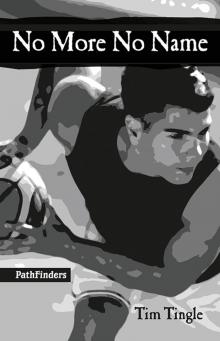 No More No Name
No More No Name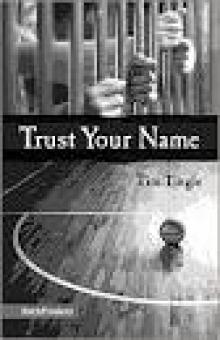 Trust Your Name
Trust Your Name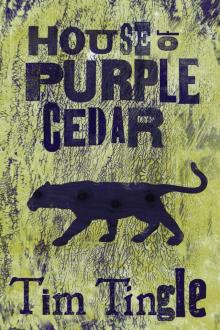 House of Purple Cedar
House of Purple Cedar NO-NAME
NO-NAME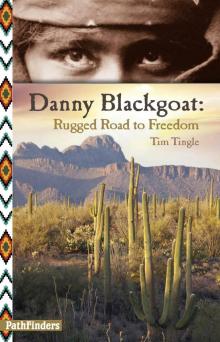 Danny Blackgoat: Rugged Road to Freedom
Danny Blackgoat: Rugged Road to Freedom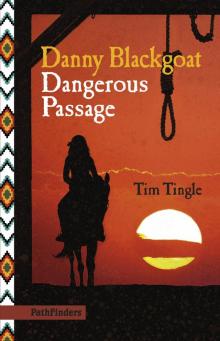 Danny Blackgoat
Danny Blackgoat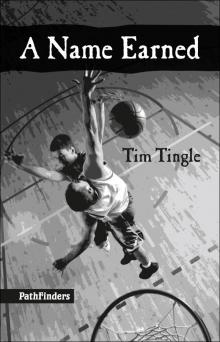 A Name Earned
A Name Earned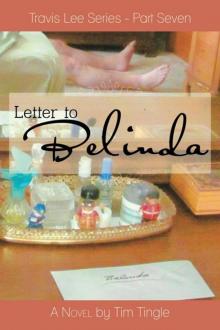 Letter to Belinda
Letter to Belinda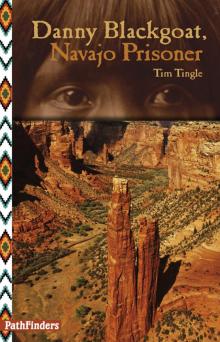 Danny Blackgoat, Navajo Prisoner
Danny Blackgoat, Navajo Prisoner